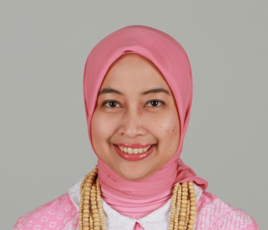Asia-Pacific Mental Health and Well-being Congress
THEME: "Future Directions: Pioneering Mental Health and Well-being Initiatives"
 27-29 Oct 2025
27-29 Oct 2025  Bali, Indonesia
Bali, Indonesia THEME: "Future Directions: Pioneering Mental Health and Well-being Initiatives"
 27-29 Oct 2025
27-29 Oct 2025  Bali, Indonesia
Bali, Indonesia 
Brainspotting Indonesia, Indonesia
Title: Brainspotting Therapy for Trauma Survivors in Indonesia: Insights into Multicultural and Multilingual Challenges
Ine Indriani is a clinical psychologist who
practices in hospitals and has a private practice in Jakarta, Indonesia. She
has an interest in trauma issues, considering that many psychological problems
arise from traumatic experiences. She studied trauma and various
psychotherapies, and then focused on Brainspotting therapy and became a part of
the International Brainspotting Trainer and Consultant. Ine was entrusted by
David Grand, the founder of Brainspotting therapy, to lead Brainspotting
Indonesia. In addition to providing training and consultations related to
Brainspotting, Ine has also written a book in Indonesian entitled Trauma &
Attunement: A Journey to Recovery, and leads various workshops on trauma for
mental health practitioners and the general public.
Brainspotting is a therapy that helps identify, process, and release
trauma stored in the subcortex of the brain, as well as body memory. Discovered
by David Grand in 2003, this therapy also emphasizes the basic attitudes that
Brainspotting practitioners need to have, known as a dual attunement frame,
which consists of relational and neurobiological attunement. Relational
attunement means the practitioner needs to build a relationship with the
client, not just empathy, but also giving full attention and accepting the
client as they are, without assuming anything (the uncertainty principle), so
that a therapeutic relationship is formed. This condition enables the client to
feel accepted, understood, and safe, thereby preparing them to process the
trauma they have experienced. Neurobiological attunement, where the therapist
utilizes the field of vision and body sensation to access trauma in the subcortex
and body, facilitates a deeply healing process by bypassing the neocortex and
relying on fewer words (less verbal). Many cases of trauma have been found in
Indonesian society, caused by various factors, such as domestic violence,
parenting styles, multiple forms of violence and crime in the community,
natural disasters, challenging financial conditions, and many others. Indonesia
itself is a country with more than 1,300 ethnic groups and more than 700 local
languages, making it a challenge to help clients process trauma when relying on
verbal therapy or when practitioners have cultural and linguistic differences
with the client. Based on the results of interviews with Brainspotting
practitioners spread across Indonesia, it was found that Brainspotting therapy,
which is less verbal, accesses the subcortex and relies on a dual attunement
frame, is very helpful in processing trauma issues more quickly and deeply than
using conventional therapy that relies on words. Brainspotting therapy is an
open model that can be integrated with other modalities and adapted to meet
individual needs, greatly assisting Brainspotting practitioners in tailoring
trauma healing to each client's specific condition and cultural context.